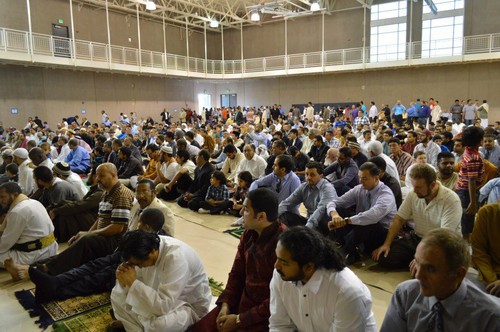Kufr in Islam: what is it and what are it’s types :
Learning about Kufr is an essential part of Muslim’s knowledge about his faith. Without knowing Kufr, আপনি cannot do justice to Tawheed. Kufr is used in the Glorious Qur’an for people who cover up অথবা hide the truth. It also uses this word to point out those who denied the favors of Allah দ্বারা not accepting his Dominion and Authority. Therefore Kufr is the opposite of Imaan অথবা Disbelief in Allah and a Non-Believer is called Kaafir.
A person can be categorized as Kaafir অথবা Murtadd (meaning apostate) if the following twelve beliefs অথবা actions are found in him. Everyone should be aware of what Kufr is so that we can save ourselves from its dangers. Not knowing about kufr may result in আপনি thinking that আপনি are a Muslim, yet in reality আপনি come under the category of Kaafir (May Allah save us from such disgrace).
However, unless we have clear and irrefutable evidence, ensure not to haste in labeling a person who claims to be Muslim as a kaafir (disbeliever) অথবা Murtadd (Apostate). Leave this job to the scholars of Islam. But when আপনি feel the need of letting people know about the person’s kufr, আপনি may mention that his actions portray kufr in them. The reason for not directly assigning a person the label of a kaafir (Disbeliever) is the warning from prophet (pbuh) in the below Hadith:
Ibn Umar (radiallahu ‘anhu) reports that the Prophet (sallallahu ‘alaihi wa sallam) ব্যক্ত “Any person who called his brother ‘O Unbeliever’ (has in fact done an act দ্বারা which this kufr) would return to one of them. If it were so as he (the accuser) asserted, (the kufr of the accused would be confirmed, but if the kufr was not true) then it returned to him (the man who called his brother Muslim a kaafir).” Muslim.
There are matters which may indeed indicate অথবা even necessitate that a person be a disbeliever (kaafir) such as defiling the Qur’aan অথবা cursing the Prophet (sallallaahu ‘alaihi wa sallam) regardless of what the person espouses and it is only Allah who knows the unseen. As humans we can only judge অথবা make determinations from what is outwardly evident.
Kufr (disbelief) is of two types: action (‘amaly) and belief (‘itiqaady ), some of which may be termed “kufr doona kufr” that is, a degree of kufr less than the total kufr which does not necessarily put one outside of ইসলাম although such a person’s ইসলাম may be doubtful অথবা in grave danger. This is the explanation of Qur’aan 5:44 দ্বারা the companion Ibn Abbaas (radiallahu ‘anhu) collected দ্বারা Ibn Jareer and quoted দ্বারা Ibn Katheer on the authority of ‘Ataa.
1) To disavow Allah’s Lordship (Ruboobiyah) অথবা Deity and singular right to be worshipped (Uloohiyah) [Qur'aan 4:48 & 116, 5:72, 39:2-3, 51:56] অথবা the message of any of the Messengers of Allah (Tawheed) [Qur'aan 10:35, 16:36] অথবা to claim that any Messenger অথবা Prophet (Rasool অথবা Nabiy) came after the Prophet Muhammad (sallallahu ‘alaihi wa sallam). [Qur'aan 6:93, 6:21, 7:37, 11:18-19, 18:15, 29:68, 33:40, 39:32, 61:8]
2) To deny অথবা reject any of Allah’s Attributes অথবা Names (Asmaa was Sifaat) i.e. Living, Knowing, Hearing, Seeing, Merciful, having a face and hands (though we know not in what manner yet certainly not like His creation), অথবা to add to them that which is not mentioned in the Qur’aan অথবা authentic Sunnah. i.e. Belief that Allah is not above His creation & that He is everywhere অথবা in everything অথবা to attribute any quality that is Allah’s alone to man [Qur'aan 4:48, 6:18 & 61, 10:3, 68 - 69, 20:5, 35:10, 42:11, 72:26 - 27, Ch. 112]
3) Setting up intermediaries between oneself and Allah, making supplication to them, asking their intercession, and placing one’s trust in them. Calling upon the dead, asking them for help, অথবা offering them gifts অথবা sacrifices is all shirk. [Qur'aan 2:165 & 255, 5:72, 30:52, 39:44]. To give any of the creation that which is due to Allah alone অথবা to be pleased with being প্রদত্ত worship besides Allah in any manner [Qur'aan 21:29] thus making অথবা becoming a taaghoot (pl. tawaagheet).
4) To curse, abuse the Name of Allah, to deny অথবা to revile Him অথবা any of His Messengers অথবা Prophets অথবা Angels. [Qur'aan 2:285, 4:136, 6:10, 57:19]
5) To deny, stop, অথবা reject any Fard (obligatory) duty of the Sharia (Divine Law) i.e. Salaah, Zakaah, Saum, Hajj, Kindness to parents, অথবা Jihad. [Qur'aan 4:50, 64-65, 80] অথবা to turn away from the religion দ্বারা not learning অথবা practicing it’s precepts. [Qur'aan 32:22]
6) To deem অথবা to make permissible (halaal) what is clearly forbidden (haraam) -i.e. adultery, fornication, drinking alcohol, taking drugs, theft, murder, sorcery, magic; অথবা to make what is halaal haraam – i.e. to eat meat অথবা seafood, marry plural wives, women to veil, etc. [Qur'aan 2:102, 174-176,4:69, 6:157]
7) To deny অথবা reject any chapter, verse, অথবা letter from the Book of Allah (Al-Qur’aan) অথবা to purposely give it deviant interpretations [Qur'aan 3:7, 6:21] i.e. not derived from the Qur’aan itself, the authentic Sunnah of Muhammad (sallallahu ‘alaihi wa sallam) [Qur'aan 6:153, 16:64] অথবা according to established methods of tafseer. Abu Hurairah (radiallahu ‘anhu) reported that the Rasool (sallallahu ‘alaihi wa sallam) said, “Don’t pursue that which আপনি have no knowledge of”. Ahmed. [Qur'aan 4:59, 10:68-70].
To openly প্রদর্শনী disdain, scorn, contempt for, অথবা treat with levity the Deen of ইসলাম অথবা it’s tenets, obligatory injunctions অথবা it’s traditions. [Qur'aan 4:140] To ridicule and deride them অথবা to treat the Qur’aan as a piece of garbage অথবা filth অথবা to trample অথবা abuse it as an insult. [Qur'aan 4:83, 140, 6:4-5, 7:50-51, 9:63-66, 20:124, 41:26 27]
9) To disbelieve in the Resurrection, Punishment, অথবা Goodly reward on the দিন of Reckoning অথবা that punishment and reward are only abstract, symbolic অথবা spiritual. [Qur'aan , 56:1-2, 67:8-10, 69]
10) To say that the Righteous (Awliyaa’) are above the Prophets (‘alaihimus salaam) অথবা that some of the Righteous are exempt from acts of worship prescribed দ্বারা ইসলাম according to the Sunnah of Muhammad (sallallahu ‘alaihi wa sallam). [Qur'aan 3:85, 8:34, 10:62-63]
11) To rule অথবা judge দ্বারা other than that which Allah revealed. This is of different types and the ruling differs depending on the beliefs and actions. Whoever rules দ্বারা other than what Allah has revealed viewing it অথবা believing it to be superior অথবা better than Allah’s sharia is considered a disbeliever দ্বারা all the Muslims. Likewise, the one who substitutes the sharia with man-made laws and মতামত that as permissible, even if he says that to rule দ্বারা the sharia is better, is a disbeliever because he has made halaal what Allah has made haraam. If one rules as described following whims অথবা in opposition to someone (i.e. not viewing it as equal, a substitute অথবা superior as described above) he is considered a major sinner. [2:120, 3:85, 4:115, 5:3, 44, 49, 50, 33:36, 45:18, 58:22]. [explained in detail in Fataawa Ibn Baz, Vol. 1 Rulings on 'Aqeedah, pg. 991]
12) To support অথবা aid the polytheists (mushrikoon) against the Muslims. [3:28. 118, 4:51, 5:57]
Types of Kufr:
There are many types of Al-Kufr ul Akbar:
1. Kufrul-’Inaad: Disbelief out of stubborness. This applies to someone who knows the truth and admits to knowing the truth and admits to knowing it with his tongue, but refuses to accept it and refrains from making a declaration. Allaah subhanahu wa ta’ala says: Throw into Hell every stubborn disbeliever [Soorah Qaaf (50), Ayah 24]
2. Kufrul-Inkaar: Disbelief out of denial. This applies to someone who denies with both হৃদয় and tongue. Allaah subhanahu wa ta’ala says: They recognize the favors of Allaah, yet they deny them. Most of them are disbelievers. [Soorah Nahl (16), Ayah 83]
3. Kufrul-Kibr: Disbelief out of arrogance and pride. The disbelief দ্বারা the devils (Iblees) is an example of this type of Kufr.
4. Kufrul-Juhood: Disbelief out of rejection.This applies to someone who aknowledges the truth in his heart, but rejects it with his tongue. This types of kufr is applicable to those who calls themselves Muslims but who reject any necessary and accepted norms of ইসলাম such as Salaat and Zakat. Allaah subhanahu wa ta’ala says: They denied them (OUR SIGNS) even though their hearts believed in them , out of spite and arrogance. [Soorah Naml (27), Ayah 14]
5. Kufrul-Nifaaq: Disbelief out of hypocrisy.This applies to someone who pretends to be a believer but conceals his disbelief. Such a person is called a MUNAFIQ অথবা hypocrite. Allaah subhanahu wa ta’ala says: Verily the hypocrites will be in the lowest depths of Hell. আপনি will find no one to help them. [Soorah An Nisaa (4), Ayah 145]
6. Kufrul-Istihaal: Disbelief out of trying to make HARAM into HALAL. This applies to someone who accepts as lawful (Halal) that which Allaah has made unlawful (Haram) like alcohol অথবা adultery.Only Allaah subhanahu wa ta’ala has the prerogative to make things Halal and Haram and those who seek to interfere with His right are like rivals to Him and therefore fall outside the boundries of faith.
7. Kufrul-Kurh: Disbelief out of detesting any of Allaah’s subhanahu wa ta’ala commands. Allaah subhanahu wa ta’ala says: Perdition (destruction) has been consigned to those who disbelieve and He will render their actions void. This is because they are averse to that which Allaah has revealed so He has made their actions fruitless. [Soorah Muhammed (47), Ayah 8-9]
8. Kufrul-Istihzaha: Disbelief due to mockery and derision. Allaah subhanahu wa ta’ala says: Say: Was it at Allaah, His signs and His apostles that আপনি were mocking? Make no excuses. আপনি have disbelieved after আপনি have believed. [Soorah Taubah (9), ayah 65-66]
9. Kufrul-I’raadh: Disbelief due to avoidance. This applies to those who turn away and avoid the truth. Allaah subhanahu wa ta’ala says: And who is আরো unjust than he who is reminded of his Lord’s signs but then turns away from them. Then he forgets what he has sent অগ্রবর্তী (for the দিন of Judgement) [Soorah Kahf (18), Ayah 57]
10. Kufrul-Istibdaal: Disbelief because of trying to substitute Allaah’s Laws. This could take the form of:
(a) Rejection of Allaah’s law (Sharee’ah) without denying it
(b) Denial of Allaah’s law and therefore rejecting it, or
(c) Substituting Allaah’s laws with man-made laws. Allaah subhanahu wa ta’ala says: অথবা have they partners with Allaah who have instituted for them a religion which Allaah has not allowed. [Soorah Shuraa(42), Ayah 8] Allaah subhanahu wa ta’ala says: Say not concerning that which your tongues put forth falsely (that) is lawful and this is forbidden so as to invent a lie against Allaah. Verily, those who invent a lie against Allaah will never prosper. [Soorah Nahl (16), Ayah 116]
Learning about Kufr is an essential part of Muslim’s knowledge about his faith. Without knowing Kufr, আপনি cannot do justice to Tawheed. Kufr is used in the Glorious Qur’an for people who cover up অথবা hide the truth. It also uses this word to point out those who denied the favors of Allah দ্বারা not accepting his Dominion and Authority. Therefore Kufr is the opposite of Imaan অথবা Disbelief in Allah and a Non-Believer is called Kaafir.
A person can be categorized as Kaafir অথবা Murtadd (meaning apostate) if the following twelve beliefs অথবা actions are found in him. Everyone should be aware of what Kufr is so that we can save ourselves from its dangers. Not knowing about kufr may result in আপনি thinking that আপনি are a Muslim, yet in reality আপনি come under the category of Kaafir (May Allah save us from such disgrace).
However, unless we have clear and irrefutable evidence, ensure not to haste in labeling a person who claims to be Muslim as a kaafir (disbeliever) অথবা Murtadd (Apostate). Leave this job to the scholars of Islam. But when আপনি feel the need of letting people know about the person’s kufr, আপনি may mention that his actions portray kufr in them. The reason for not directly assigning a person the label of a kaafir (Disbeliever) is the warning from prophet (pbuh) in the below Hadith:
Ibn Umar (radiallahu ‘anhu) reports that the Prophet (sallallahu ‘alaihi wa sallam) ব্যক্ত “Any person who called his brother ‘O Unbeliever’ (has in fact done an act দ্বারা which this kufr) would return to one of them. If it were so as he (the accuser) asserted, (the kufr of the accused would be confirmed, but if the kufr was not true) then it returned to him (the man who called his brother Muslim a kaafir).” Muslim.
There are matters which may indeed indicate অথবা even necessitate that a person be a disbeliever (kaafir) such as defiling the Qur’aan অথবা cursing the Prophet (sallallaahu ‘alaihi wa sallam) regardless of what the person espouses and it is only Allah who knows the unseen. As humans we can only judge অথবা make determinations from what is outwardly evident.
Kufr (disbelief) is of two types: action (‘amaly) and belief (‘itiqaady ), some of which may be termed “kufr doona kufr” that is, a degree of kufr less than the total kufr which does not necessarily put one outside of ইসলাম although such a person’s ইসলাম may be doubtful অথবা in grave danger. This is the explanation of Qur’aan 5:44 দ্বারা the companion Ibn Abbaas (radiallahu ‘anhu) collected দ্বারা Ibn Jareer and quoted দ্বারা Ibn Katheer on the authority of ‘Ataa.
1) To disavow Allah’s Lordship (Ruboobiyah) অথবা Deity and singular right to be worshipped (Uloohiyah) [Qur'aan 4:48 & 116, 5:72, 39:2-3, 51:56] অথবা the message of any of the Messengers of Allah (Tawheed) [Qur'aan 10:35, 16:36] অথবা to claim that any Messenger অথবা Prophet (Rasool অথবা Nabiy) came after the Prophet Muhammad (sallallahu ‘alaihi wa sallam). [Qur'aan 6:93, 6:21, 7:37, 11:18-19, 18:15, 29:68, 33:40, 39:32, 61:8]
2) To deny অথবা reject any of Allah’s Attributes অথবা Names (Asmaa was Sifaat) i.e. Living, Knowing, Hearing, Seeing, Merciful, having a face and hands (though we know not in what manner yet certainly not like His creation), অথবা to add to them that which is not mentioned in the Qur’aan অথবা authentic Sunnah. i.e. Belief that Allah is not above His creation & that He is everywhere অথবা in everything অথবা to attribute any quality that is Allah’s alone to man [Qur'aan 4:48, 6:18 & 61, 10:3, 68 - 69, 20:5, 35:10, 42:11, 72:26 - 27, Ch. 112]
3) Setting up intermediaries between oneself and Allah, making supplication to them, asking their intercession, and placing one’s trust in them. Calling upon the dead, asking them for help, অথবা offering them gifts অথবা sacrifices is all shirk. [Qur'aan 2:165 & 255, 5:72, 30:52, 39:44]. To give any of the creation that which is due to Allah alone অথবা to be pleased with being প্রদত্ত worship besides Allah in any manner [Qur'aan 21:29] thus making অথবা becoming a taaghoot (pl. tawaagheet).
4) To curse, abuse the Name of Allah, to deny অথবা to revile Him অথবা any of His Messengers অথবা Prophets অথবা Angels. [Qur'aan 2:285, 4:136, 6:10, 57:19]
5) To deny, stop, অথবা reject any Fard (obligatory) duty of the Sharia (Divine Law) i.e. Salaah, Zakaah, Saum, Hajj, Kindness to parents, অথবা Jihad. [Qur'aan 4:50, 64-65, 80] অথবা to turn away from the religion দ্বারা not learning অথবা practicing it’s precepts. [Qur'aan 32:22]
6) To deem অথবা to make permissible (halaal) what is clearly forbidden (haraam) -i.e. adultery, fornication, drinking alcohol, taking drugs, theft, murder, sorcery, magic; অথবা to make what is halaal haraam – i.e. to eat meat অথবা seafood, marry plural wives, women to veil, etc. [Qur'aan 2:102, 174-176,4:69, 6:157]
7) To deny অথবা reject any chapter, verse, অথবা letter from the Book of Allah (Al-Qur’aan) অথবা to purposely give it deviant interpretations [Qur'aan 3:7, 6:21] i.e. not derived from the Qur’aan itself, the authentic Sunnah of Muhammad (sallallahu ‘alaihi wa sallam) [Qur'aan 6:153, 16:64] অথবা according to established methods of tafseer. Abu Hurairah (radiallahu ‘anhu) reported that the Rasool (sallallahu ‘alaihi wa sallam) said, “Don’t pursue that which আপনি have no knowledge of”. Ahmed. [Qur'aan 4:59, 10:68-70].
To openly প্রদর্শনী disdain, scorn, contempt for, অথবা treat with levity the Deen of ইসলাম অথবা it’s tenets, obligatory injunctions অথবা it’s traditions. [Qur'aan 4:140] To ridicule and deride them অথবা to treat the Qur’aan as a piece of garbage অথবা filth অথবা to trample অথবা abuse it as an insult. [Qur'aan 4:83, 140, 6:4-5, 7:50-51, 9:63-66, 20:124, 41:26 27]
9) To disbelieve in the Resurrection, Punishment, অথবা Goodly reward on the দিন of Reckoning অথবা that punishment and reward are only abstract, symbolic অথবা spiritual. [Qur'aan , 56:1-2, 67:8-10, 69]
10) To say that the Righteous (Awliyaa’) are above the Prophets (‘alaihimus salaam) অথবা that some of the Righteous are exempt from acts of worship prescribed দ্বারা ইসলাম according to the Sunnah of Muhammad (sallallahu ‘alaihi wa sallam). [Qur'aan 3:85, 8:34, 10:62-63]
11) To rule অথবা judge দ্বারা other than that which Allah revealed. This is of different types and the ruling differs depending on the beliefs and actions. Whoever rules দ্বারা other than what Allah has revealed viewing it অথবা believing it to be superior অথবা better than Allah’s sharia is considered a disbeliever দ্বারা all the Muslims. Likewise, the one who substitutes the sharia with man-made laws and মতামত that as permissible, even if he says that to rule দ্বারা the sharia is better, is a disbeliever because he has made halaal what Allah has made haraam. If one rules as described following whims অথবা in opposition to someone (i.e. not viewing it as equal, a substitute অথবা superior as described above) he is considered a major sinner. [2:120, 3:85, 4:115, 5:3, 44, 49, 50, 33:36, 45:18, 58:22]. [explained in detail in Fataawa Ibn Baz, Vol. 1 Rulings on 'Aqeedah, pg. 991]
12) To support অথবা aid the polytheists (mushrikoon) against the Muslims. [3:28. 118, 4:51, 5:57]
Types of Kufr:
There are many types of Al-Kufr ul Akbar:
1. Kufrul-’Inaad: Disbelief out of stubborness. This applies to someone who knows the truth and admits to knowing the truth and admits to knowing it with his tongue, but refuses to accept it and refrains from making a declaration. Allaah subhanahu wa ta’ala says: Throw into Hell every stubborn disbeliever [Soorah Qaaf (50), Ayah 24]
2. Kufrul-Inkaar: Disbelief out of denial. This applies to someone who denies with both হৃদয় and tongue. Allaah subhanahu wa ta’ala says: They recognize the favors of Allaah, yet they deny them. Most of them are disbelievers. [Soorah Nahl (16), Ayah 83]
3. Kufrul-Kibr: Disbelief out of arrogance and pride. The disbelief দ্বারা the devils (Iblees) is an example of this type of Kufr.
4. Kufrul-Juhood: Disbelief out of rejection.This applies to someone who aknowledges the truth in his heart, but rejects it with his tongue. This types of kufr is applicable to those who calls themselves Muslims but who reject any necessary and accepted norms of ইসলাম such as Salaat and Zakat. Allaah subhanahu wa ta’ala says: They denied them (OUR SIGNS) even though their hearts believed in them , out of spite and arrogance. [Soorah Naml (27), Ayah 14]
5. Kufrul-Nifaaq: Disbelief out of hypocrisy.This applies to someone who pretends to be a believer but conceals his disbelief. Such a person is called a MUNAFIQ অথবা hypocrite. Allaah subhanahu wa ta’ala says: Verily the hypocrites will be in the lowest depths of Hell. আপনি will find no one to help them. [Soorah An Nisaa (4), Ayah 145]
6. Kufrul-Istihaal: Disbelief out of trying to make HARAM into HALAL. This applies to someone who accepts as lawful (Halal) that which Allaah has made unlawful (Haram) like alcohol অথবা adultery.Only Allaah subhanahu wa ta’ala has the prerogative to make things Halal and Haram and those who seek to interfere with His right are like rivals to Him and therefore fall outside the boundries of faith.
7. Kufrul-Kurh: Disbelief out of detesting any of Allaah’s subhanahu wa ta’ala commands. Allaah subhanahu wa ta’ala says: Perdition (destruction) has been consigned to those who disbelieve and He will render their actions void. This is because they are averse to that which Allaah has revealed so He has made their actions fruitless. [Soorah Muhammed (47), Ayah 8-9]
8. Kufrul-Istihzaha: Disbelief due to mockery and derision. Allaah subhanahu wa ta’ala says: Say: Was it at Allaah, His signs and His apostles that আপনি were mocking? Make no excuses. আপনি have disbelieved after আপনি have believed. [Soorah Taubah (9), ayah 65-66]
9. Kufrul-I’raadh: Disbelief due to avoidance. This applies to those who turn away and avoid the truth. Allaah subhanahu wa ta’ala says: And who is আরো unjust than he who is reminded of his Lord’s signs but then turns away from them. Then he forgets what he has sent অগ্রবর্তী (for the দিন of Judgement) [Soorah Kahf (18), Ayah 57]
10. Kufrul-Istibdaal: Disbelief because of trying to substitute Allaah’s Laws. This could take the form of:
(a) Rejection of Allaah’s law (Sharee’ah) without denying it
(b) Denial of Allaah’s law and therefore rejecting it, or
(c) Substituting Allaah’s laws with man-made laws. Allaah subhanahu wa ta’ala says: অথবা have they partners with Allaah who have instituted for them a religion which Allaah has not allowed. [Soorah Shuraa(42), Ayah 8] Allaah subhanahu wa ta’ala says: Say not concerning that which your tongues put forth falsely (that) is lawful and this is forbidden so as to invent a lie against Allaah. Verily, those who invent a lie against Allaah will never prosper. [Soorah Nahl (16), Ayah 116]





















